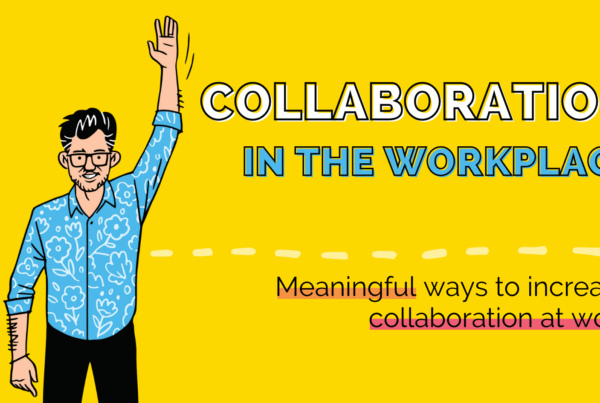
Here’s something you’ll never hear anyone say – “I just feel too appreciated at work.”
There’s a reason for that.
People love feeling seen, heard, acknowledged, and that their hard work is considered and appreciated.
But organizations often spend way too much time celebrating and glorifying successful outcomes and not enough celebrating people during the bumps, dings, failures, growth, and progress that precede those winning moments.
They celebrate success at work but don’t celebrate all the time spent in the trenches to get there.
In doing so, they’re missing a trick.
As Harvard Business Review shows, the best way to unlock employee motivation and turbocharge engagement is to appreciate people for their inherent value, as well as recognize them for their achievements.
The Greatest Answers Come From the Greatest Questions
Become a better leader. Better teacher. Better person.
Learn how to ask the right questions the right way with this free download.
Eight Ways to Ask a Question Well
So, if you want to unlock greatness in your people and nurture a thriving, effective team, you’re going to want to recalibrate when and why you celebrate your team members.
Here’s how to do it:
1. Embody I/Thou Relationships
To make your people feel truly appreciated, you need to see them in their full humanity, as the messy, complex, beautiful human beings that they are.
This means moving from I/it relationships to I/thou relationships, in the words of Martin Buber.
You see, in an I/it relationship, you see the other person as an object. This means you see the relationship as mechanical and transactional. When you’re simply trying to get something from the other person, you lose sight of the human behind the task.
I/thou relationships, on the other hand, allow you to see the person behind the transaction, light up their mojo, and appreciate them for who they are and who they hope to become.
In my latest book, How to Work With (Almost) Anyone, I give you a framework to help you move from I/It relationships to I/thou relationships.
I call this the Keystone Conversation – a discussion centered around seven questions that help you connect to your colleague’s humanity.
The Keystone Conversation allows you to truly show your appreciation for the human being in front of you, instead of simply giving them a transactional pat on the back.
2. Appreciate the Smarts of the Process
Remember the miracle of the Hudson River plane crash? When Captain Sully landed a plane that had lost power in both engines? Without any casualties?
Captain Sully was celebrated as a hero, but he himself emphasized that his success was the result of a team effort and a brilliant process – a step-by-step checklist that he and his co-pilot followed through to the letter.
Even though Captain Sully was the one in the spotlight, a whole bunch of people contributed to the success of that plane landing safely. As Atul Gawande succinctly puts it in his fascinating book, The Checklist Manifesto, the outcome “was the result of teamwork and adherence to procedure as much as any individual skill.”
This story serves as a powerful reminder that, when you celebrate an individual at the outcome level, that person is probably getting too much credit, and you’re probably overlooking other people who were vital to their success at the process level.
On top of that, we have to remember that outcomes are often in the lap of the gods, while processes are things that you can control and influence. Sometimes, you do it all right and you still fail. Sometimes, you do it all wrong and succeed by dumb luck.
So, instead of putting all your juice and zest into celebrating successful outcomes, start celebrating your people’s commitment to the process and the smarts of the process – whether the end result is a success or not.
And if the end result isn’t a success, then try to remember Kipling’s words – “If you can meet with Triumph and Disaster and treat those two impostors just the same… Yours is the Earth and everything that’s in it.”
3. Embrace the Condition of Enoughness
When is enough, enough for you? That’s what my friend, Jen Louden, once asked me, and it’s been revolutionary for how I approach celebrating success.
We’re all guilty of seeing accomplishments in black-and-white terms. You either win or you lose. You either succeed or fail.
But the trouble is, when we approach work in this way, we miss out on the generous space that lies between success and failure.
That’s the space of enoughness – the project that went well but wasn’t perfect, the mishap that unlocked crucial learnings and growth, the to-do list that your team got 70% of the way through.
It’s so easy to get caught up in the hurly-burly of the day, to just keep moving. But when you work with your team to decide what enough looks like, you unlock tons of new opportunities for appreciation and celebration based on progress, not just results.
4. Celebrate Progress
Speaking of progress, I have to mention the wonderful book, The Progress Principle by Teresa Amabile, which holds another key insight for celebrating and appreciating employees correctly.
Over the course of a multi-year study, Teresa and her team discovered that people feel most uplifted and engaged at work when they make regular progress on the stuff that matters.
So, instead of only celebrating your team at the end of the year or the end of a project, make room for ongoing appreciation by learning to help your team make progress, noticing this progress, and then celebrating their great efforts and small wins.
5. Find the Gift in Failure
Tolstoy famously started his novel Anna Karenina, “All happy families are alike; every unhappy family is unhappy in its own way.”
Likewise, stories of success are all alike. But stories of how people bounce back from failure are where things get interesting.
I love someone who knows how to share their failures well. When I get introduced as a keynote speaker, I have them mention that I was banned from my high school graduation and left law school being sued by one of my professors.
And that’s just a start if I say so myself. My failures are what’s helped me find my edge. And they’ll help your people find theirs too.
So, let me ask you – what’s your culture around failure? Do you celebrate your team for striving, stretching, and failing? Or is failure a source of shame?
To improve how you approach failure, I recommend borrowing the “after-action review” process from the US Military.
After every engagement, whether successful or not, the commanders gather their team together and guide them through some straightforward questions in a blame-free way.
They ask:
- What went well?
- What could have been done better?
- What did we learn from this?
- What do we need to do now?
- What do we need to do next time?
Incorporating this review process into your life is a really powerful way to celebrate your team for their efforts while generating important learning moments.
6. Practice Fierce Love
Sometimes, the best way to celebrate someone is to give them a pat on the back for their hard work. Other times, it’s to push them to reach their potential and support them through challenges as they arise.
I call this practice, fierce love:
- Love, meaning I want the people I work with to be the best versions of themselves. I want them to feel valued for who they are.
- Fierce, meaning I’m not necessarily just going to be nice when I do that. I’m going to give constructive feedback, asking for what I want and provoking my team to unlock the best of who they can be.
Being generous with fierce love is one of the best ways to not only appreciate the people you work with but also to build trust in the workplace.
By wholeheartedly supporting your colleagues, championing them, and helping them stretch themselves, you’ll create a culture where your employees are full of zest for the work they do.
7. Learn Their Love Languages
I resisted reading Gary Chapman’s The Five Love Languages for years. I thought it would be too woo-woo and touchy-feely for me. But I was wrong. It’s a simple, helpful model for building better workplace relationships.
Our love language is how we like to be appreciated. The five different love languages are:
- Words of affirmation (saying supportive things)
- Acts of service (doing helpful things)
- Receiving gifts (giving thoughtful gifts)
- Quality time (spending meaningful time)
- Physical touch (being close)
Understanding how each of your team members likes to receive love is a powerful way to show appreciation in a way that is meaningful to them.
To discover your team members’ love languages (especially if you don’t want to ask directly), think about how they express appreciation. People often tend to “give” in the language that they most like to receive.
8. Help Them Do More Great Work
One of the most overlooked ways to appreciate people is to help them do less bad work (and even good work) and more great work.
Bad work, to put it bluntly, is work that’s pointless, meaningless, and a waste of time, energy, and life.
Good work is solid, productive, important – but not anything you’re particularly thrilled, excited, or stretched by doing.
Great work is the work that’s meaningful, important, and makes a difference. It’s the work that stretches you and inspires you, the work that sits at that crossroads between daunting and exhilarating, the work that unlocks your intrinsic motivation and drive.
To thoughtfully appreciate the people you work with, think about what lights them up and keeps them going. What are their ambitions for themselves and the world? What work will unlock their greatness?
When you give people great work, when you say to someone, “Here’s why this task is perfect for you,” you give them the gift of feeling seen, heard, and understood. And that, in itself, is one of the most powerful forms of appreciation.
Celebrate People. Not Just Outcomes.
Ultimately, if you want your team to be engaged, motivated, and perform to their best ability, you’re going to want to start appreciating the people behind the work, instead of only celebrating work that goes well.
If this topic has piqued your interest, then you might like my latest book, How To Work With (Almost) Anyone. Read it to discover how to bring more zest, joy, and mutual appreciation to your workplace relationships.




